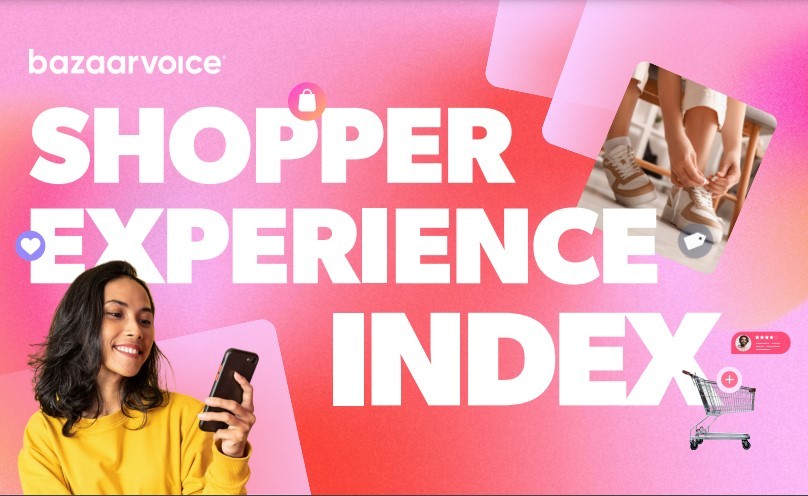How to Use Social Media for Business & Marketing
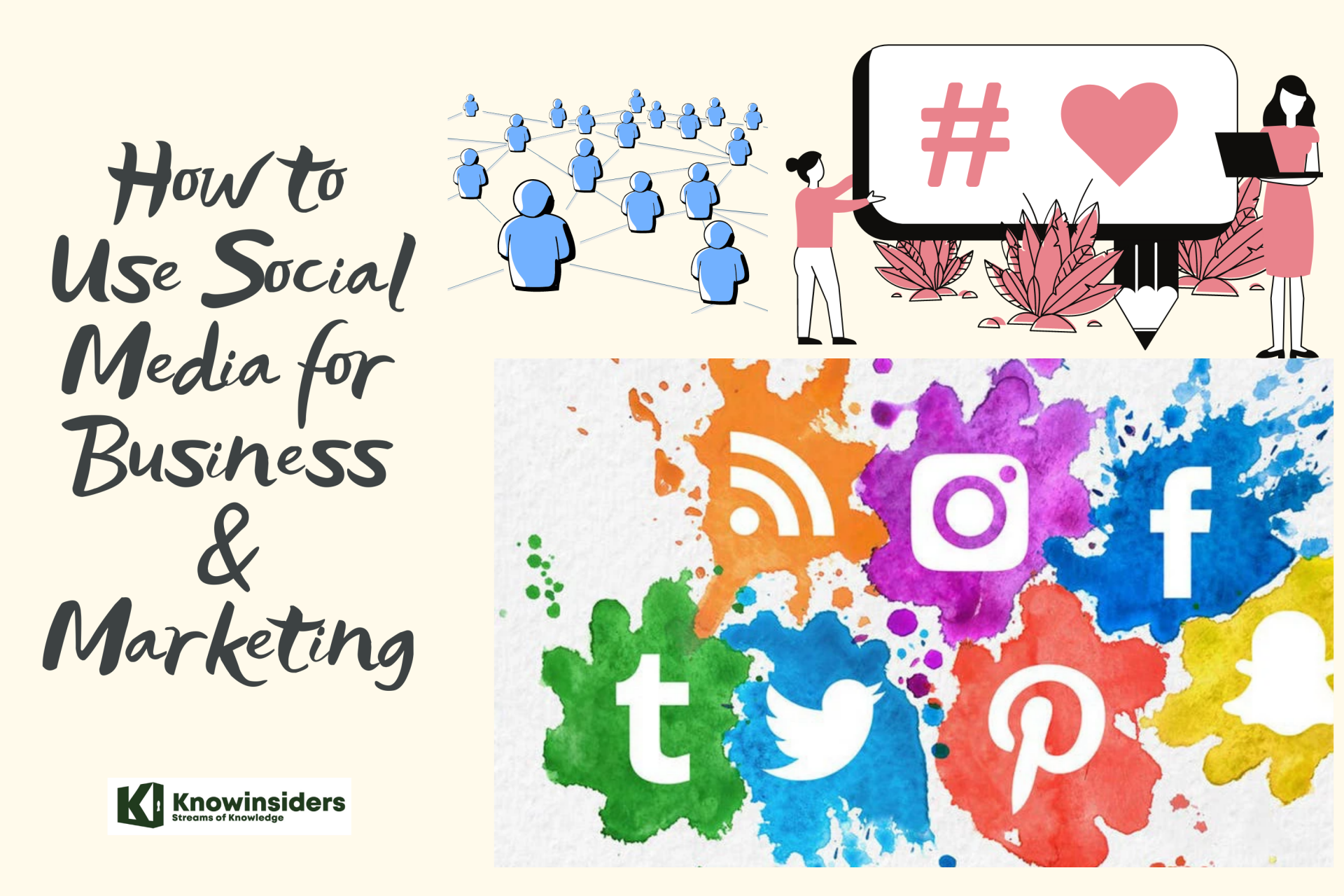 |
| Social Media for business and marketing. Photo: KnowInsiders |
Social media is a collective term for websites and applications that focus on communication, community-based input, interaction, content-sharing and collaboration.
People use social media to stay in touch and interact with friends, family and various communities. Businesses use social applications to market and promote their products and track customer concerns.
Not all social media platforms will be right for your business. Consider saving save time and effort by using social media tools that your customers use. Below is a brief guide to help you understand some of the options available.
What is a Social Media Platform?
The term social media refers to a computer-based technology that facilitates the sharing of ideas, thoughts, and information through virtual networks and communities. Social media is internet-based and gives users quick electronic communication of content, such as personal information, documents, videos, and photos. Users engage with social media via a computer, tablet, or smartphone via web-based software or applications. While social media is ubiquitous in America and Europe, Asian countries like Indonesia lead the list of social media usage. More than 4.5 billion people use social media, as of October 2021.
Key Takeaways* Social media is a computer-based technology that facilitates the sharing of ideas, thoughts, and information through the building of virtual networks and communities. * There are more than 4.5 billion social media users around the world. * The largest social media networks include Facebook, Instagram, Twitter, YouTube, and TikTok. * Social media typically features user-generated content and personalized profiles. * By 2023, the number of social media users in the United States is forecast to increase to approximately 257 million. |
Understanding Social Media
Social media originated as a way to interact with friends and family but was later adopted by businesses that wanted to take advantage of a popular new communication method to reach out to customers. The power of social media is the ability to connect and share information with anyone on Earth, or with many people simultaneously.
There are more than 3.8 billion social media users around the world. Social media is an ever-changing and ever-evolving field, with new apps such as TikTok and Clubhouse coming out seemingly every year, joining the ranks of established social networks like Facebook, YouTube, Twitter, and Instagram. By 2023, the number of social media users in the United States is forecast to increase to approximately 257 million.
According to the Pew Research Center, social media users tend to be younger. Nearly 90% of people between the ages of 18 and 29 used at least one form of social media. Further, these users tend to be better educated and relatively wealthy, or earning over $75,000 per year.
Types of Social Media
Social media may take the form of a variety of tech-enabled activities. These activities include photo sharing, blogging, social gaming, social networks, video sharing, business networks, virtual worlds, reviews, and much more. Even governments and politicians utilize social media to engage with constituents and voters.
For individuals, social media is used to keep in touch with friends and extended family. Some people will use various social media applications to network career opportunities, find people across the globe with like-minded interests, and share their thoughts, feelings, insights, and emotions. Those who engage in these activities are part of a virtual social network.
For businesses, social media is an indispensable tool. Companies use the platform to find and engage with customers, drive sales through advertising and promotion, gauge consumer trends, and offer customer service or support.
Social media's role in helping businesses is significant. It facilitates communication with customers, enabling the melding of social interactions on e-commerce sites. Its ability to collect information helps focus on marketing efforts and market research. It helps in promoting products and services, as it enables the distribution of targeted, timely, and exclusive sales and coupons to would-be customers. Further, social media can help in building customer relationships through loyalty programs linked to social media, as reported by Investopedia.
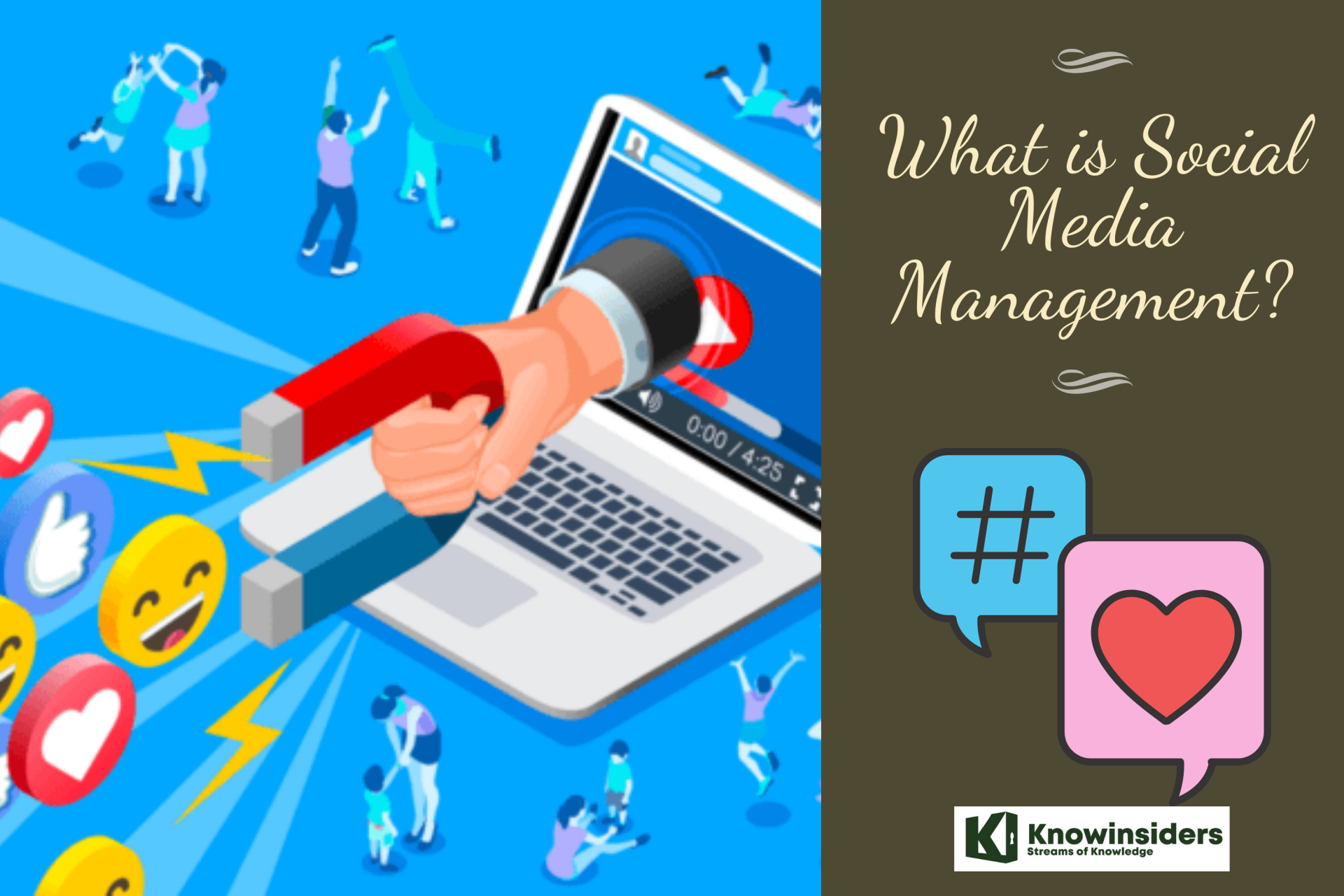 What is Social Media Management? What is Social Media Management? Social media management tools and services are designed to make marketing easier, which ultimately increases profits, especially for small businesses. Check out this article to ... |
How to Create a Social Media Strategy
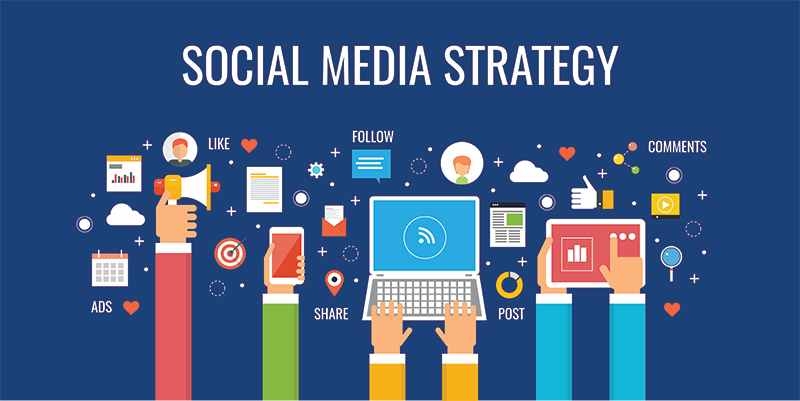 |
| Photo: www.smallbizdaily.com |
What is a social media strategy?
A social media strategy is a document outlining your social media goals, the tactics you will use to achieve them and the metrics you will track to measure your progress.
Your social media marketing strategy should also list all of your existing and planned social media accounts along with goals specific to each platform you’re active on. These goals should align with your business’s larger digital marketing strategy.
Finally, a good social media plan should define the roles and responsibilities within your team and outline your reporting cadence.
1. Start with a plan
It’s easy to get started using social media for business purposes. We all use social media in our day-to-day lives, so there’s a level of comfort with the tools.
It doesn’t cost anything to create a Facebook Page for your business, or start posting on Instagram, or create a presence on Twitter.
But before you leap in feet first, remember: every good business strategy starts with a good plan. Yes, you can use social tools for free. But the time and effort involved still represent an investment in your business.
Without a plan, you have no clear goal for what you’re trying to achieve. That means there’s no way to know if you’re getting a return on that investment.
Take the time to create a social media plan upfront. This ensures all your social efforts support specific business goals.
Here are some strategic social media tips from our guide to creating a social media marketing plan:
* Set social media goals and objectives
* Research the competition
* Conduct a social media audit
* Get inspired
* Create a social media calendar
2. Decide which platforms are right for you
Don’t make assumptions about where your audience spends their time online.
Your instinct might tell you that if you’re targeting Gen Z, you should skip Facebook and focus on Instagram and TikTok. But the data shows that nearly a quarter of Facebook users are aged 18 to 24.
If you’re selling to baby boomers, social might not seem like a top priority. But it should be. Facebook and Pinterest are the top social networks for boomers. Adults over age 65 are Facebook’s fastest growing audience segment.
Maybe you think TikTok marketing is not the right fit for your brand. But even well-established brands with an audience well outside Gen Z are experimenting with this platform.
3. Know your audience
One reason using social media for business is so effective is that you can micro-target your audience. But first, you need to understand who your audience is.
Start by compiling data on your current customers. Then, dig deeper with social media analytics. You’ll soon start to understand who’s buying from and interacting with you online.
Hootsuite Insights Powered by Brandwatch can help you uncover detailed information like the top hashtags, referral sites, and even specific social authors for terms relevant to your business.
4. Expand your audience
Once you have a clear picture of who your audience is, you can revisit your social media plan. It’s time to look for ways to reach more people just like them.
For example, when lockdown measures meant more people were looking for ways to fill their time at home, The Great Courses Plus switched up its Facebook advertising strategy to expand its audience quickly.
They created an extended free trial offer and advertised it to a broad audience in the United States. They then used lookalike audiences to reach new audiences in Canada, the UK, and Australia who were similar to their best existing customers.
5. Build relationships
The unique benefit of social media marketing for small business is that it allows you to talk directly to customers and followers. You can build relationships over time, rather than asking for a sale upfront.
That said, you certainly can use social to get a sale upfront, as we explain in Tip 7.
More than 44% of internet users use social networks to research brands. Part of that discovery is getting to know who you are as a brand and what you stand for.
When people engage with your organic content or ads, it’s a great idea to engage back. This helps to build trust and form a loyal following. As fans share and like your content, you rise in the social algorithms and gain new, free, exposure.
For most Facebook users, there are more than 1,000 potential Newsfeed posts at any one time. Engagement is one of the signals Facebook uses to help predict which of those posts users are likely to see. When you establish relationships with your followers, they are more likely to see your posts.
Nurturing relationships can also help you build a loyal community that will lead to ongoing sales over time. New customer acquisition is great, but don’t downplay the value of customer retention.
In Hootsuite’s Social Transformation survey, 69% of respondents said social media helped maintain customer relationships during the very different marketing era of COVID-19. And Twitter data shows 70% of people say it’s important for bands to help boost positivity right now.
6. Pay attention to trends
We’re not saying you should leap on every meme that goes viral. (Please don’t leap on every meme that goes viral.)
But it is a good idea to pay attention to trends in social media, so you understand what people are looking for when they sign into their social channels. This helps you create appropriate content that resonates over time.
State Farm insurance has an ongoing Pinterest campaign that provides informative content tied to major life changes like buying a car or having a child. Since these moments tend to impact insurance needs, it’s an obvious fit that has helped the insurance giant connect with millennials and Gen X.
7. Sell your stuff with social commerce
Social media marketing has evolved in recent years to include social commerce: the ability to sell your products directly from social channels. And business is booming, with a global market value of $89.4 billion in 2020.
By June 2020, 18.3% of U.S. adults had made a purchase via Facebook, and another 11.1% via Instagram.
You can now use social shopping tools to sell your products and services even without a website.
We break down all the details in individual posts explaining how to use Instagram Shopping, how to sell with Facebook Shops, and the best ways to use Instagram Live Shopping.
8. Mix up your formats
Make sure to switch up your social post formats from time to time. If you usually post GIFs, try a JPG. If you normally post still images, try a video.
And take advantage of all the formats within each social network, like Stories, or Reels, or Live video.
For one thing, this helps you learn which formats work best for different types of content (more on that below) and for different social networks.
For example, the conventional wisdom is that posts with images always fare better. But Hootsuite recently ran an experiment in which plain text Tweets outperformed those with an image or GIF.
This was not true a couple of years ago, and Hootsuite would never have made this discovery if every Tweet contained an image.
Here’s another reason not to fall into a rut: The Facebook algorithm uses “content type diversity” to ensure a person’s newsfeed had a good mix of content types. Switching up your formats may boost your content’s reach.
When you do want to use images and don’t have a great photo library of your own, stock photo sites are a great source of free, high-quality photos to use in your social posts. Don’t use random images you find online. That is definitely not okay and can get you in some serious trouble.
Finally, be sure all your posts, regardless of the format, are inclusive and accessible. For a start: Add alt text to images and make sure videos have captions. And make sure your audience is fully represented in the images you share.
9. Focus on quality over quantity
The sheer number of social media marketing options for small business might seem overwhelming—but you don’t need to do it all. It’s more important to create quality content on a couple of key channels than it is to have a presence on every single network.
Above all, be sure that your social posts offer value. If all you do is pitch and sell, there’s very little motivation for people to follow you. Remember, social marketing is about building relationships.
Be human. Be honest. Post great content. This is important, and you can’t fake it.
You can’t do it all, and there’s no reason to try. Reach out to your audience in the places where they’re already spending time online.
Focus on using one or two social channels really well, at least to start. Once you’ve got those mastered, you can build from what you’ve learned and expand your efforts.
10. Use the right tools
The secret to using social media effectively is to take advantage of tools that automate or simplify much of the work.
There are loads of tools to help boost your productivity. That means you can start using social media for business without having a full-scale social media team.
11. Use scheduling and automation to free up more time for engagement
We talked about creating a social content calendar way back at the beginning of this post.
Once you have that calendar in place, you can create your social posts in advance and use scheduling tools like Hootsuite to post them automatically at the right time.
This allows you to dedicate one block of time per day or even per week to creating your social content. It’s much more effective than letting social posting take you away from other tasks throughout the day.
Automation tools like chatbots can also help you cut down on the number of hours you spend working on social media marketing.
12. Track and refine your performance
As you implement your social strategy, it’s important to keep track of what works and what doesn’t. You can then fine-tune your efforts and improve results.
The analytics tools mentioned above give you a great picture of your social efforts and can help track whichever metrics matter most to you.
Once you have an idea of how your strategy is working, it’s time to start looking for ways to improve. Using A/B testing, you can make small changes that boost your success over time.
For example, the land development advertiser Newsome Interactive LLC used testing to discover that “Learn More” was the best call to action for their Facebook ads that clicked through to Messenger.
It was not that “Learn More” resulted in the most clicks. Instead, it best set people up to complete a full chat sequence and contact form so Newsome could collect qualified leads.
“Chat Now,” on the other hand, led people to ask specific questions and drop out of the chat sequence before it was complete.
No matter the size of your business, social tools can help you better connect with your audience, reach new potential customers, and increase awareness of your brand. If the possibilities seem overwhelming, just start small.
As you find what works, expand your efforts and your audience. One of the great advantages of social media for small business is you can use the tools in whatever way makes the most sense for your business and your budget at any given time.
How Does Social Media Help Businesses?
 |
| Photo: FPT Skillking |
Benefits of using social media for business
There are several advantages to using social media for business, which increase as social media becomes more enmeshed in society. Here are eight benefits of using social media for your business.
Brand awareness
Billions of people across the world use social media every day, and it makes sense to put your business where the customers are. Roughly 60% of Instagram users said they find new products using the platform, making it well worth your while.
Brand personality
It's becoming more important than ever for businesses to have a distinct voice and engage with customers on a human level. Social media provides an easy avenue for this, allowing you to develop an identity and a voice to showcase your brand values and engage with followers.
Thought leadership
Social media provides an opportunity for businesses to both learn from and stand out from their competitors, establishing themselves as industry leaders through engaging and relevant content. You can do this by sharing creative content on Instagram, writing thoughtful blog posts for LinkedIn or showing a fresh perspective in tweets.
Increased website traffic
If your followers like your social media content, they become interested in you and go to your website to learn more about your business, which means higher website traffic and potentially more sales for you.
Reputation management
Reputation is everything, and social media gives you the perfect opportunity to communicate with customers and solve issues quickly. You can even create a special hashtag your followers can use if they have a question or complaint to ensure it is seen by the right people. You can also use social media to highlight positive reviews or comments.
Analytics and insights
Most social media platforms have their own analytics tools, which allow you to monitor things like your follower count, engagement rates and click-through rates. These numbers can help you figure out what kinds of content your followers respond to best and tweak your marketing strategy accordingly.
Competitor analysis
Social media isn't just good for engaging with your customers – you can also use it to stay on top of what your competitors are doing. Follow your competitors and take note of what seems to work well for them and what doesn't. Work those insights into your social media marketing strategy.
Targeted advertisements
It's easy to create ads on social platforms, and the benefit is that you can target them to specifically suit your audience. Research has shown that users respond better when ads are tailored to them, and this often increases engagement.
What are the disadvantages of social media for business?The disadvantages of social media largely depend on the platforms you use, but there are some universal drawbacks. The first is the investment. It takes a lot of time to manage a social media account, and if you are outsourcing the work, it will take a lot of money to pay for that time. While the initial outreach generated from those investments is usually worthwhile, social media investments generate smaller returns over time. Another major drawback is the potential for bad publicity. Something as simple as a typo can send a very wrong message, and even after you make corrections, the consequences of bad publicity will persist. It is practically inevitable that a social media account will encounter political or otherwise controversial topics, and someone is guaranteed to dislike your business's discourse. One of the hardest risks to manage is the influence of your social media followers. They will always represent a small portion of your total customers, but they will be the most vocal, and they could lead you to misread what the majority of your customers really want or think. Putting too much stock in social media can send a business down a bad track. |
Why is Social Media Important for Business?
Social media has greatly transformed the business landscape. It is one of the most important aspects of digital marketing, which provides incredible benefits that help reach millions of customers worldwide.
If you are a CEO or a small business owner, it is very important to know why you need to be on social media and how it is going to affect your business.
There are several questions you must ask yourself before you plan your social media strategy
* What are the channels where my customers are present?
* What are the ways to target my audience on those channels?
* What are my objectives and the RoI of the social media strategy?
So it is evident that how social media can have an immense impact on your business and can be one of the most powerful marketing channels to reach out to your audience.
In a nutshell, social media helps businesses in three key areas;
Brand building – Social media is one of the most profitable digital marketing platforms that boosts your brand visibility among potential customers, allowing you to reach a bigger audience. By applying a social media customer service strategy, you significantly increase your brand recognition.
Omni channel engagement – Research shows, 60% of US millennials expect consistent experiences when dealing with brands online, in-store, or by phone. Social media strategies boost user engagement across channels in order to engage customers and deliver better omni channel customer experience.
Business growth – Social interaction between businesses & customers is a growing trend that increases sales and improves brand loyalty. SMM report says, more than 65% of businesses are on social media to increase leads.
So, let’s look into the positive effects of social media on businesses.
Why Do Businesses Use Social Media?
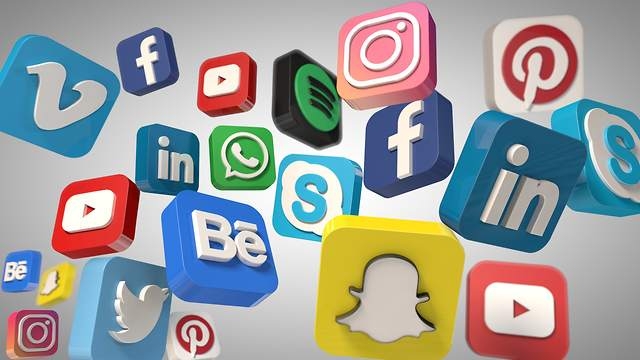 |
| Photo: Newswire.net |
Social media has more than 4 billion users worldwide. And according to sources, on average, a social media user spends about 2 hours 22 minutes a day on social platforms. This means that if used well, those 2 hours and 22 minutes every day can offer an incredible opportunity for your business to create brand awareness, attract more traffic, boost your sales and increase your overall conversion rate.
1. Helps Grow Your Reach
One of the major benefits of using social media is that it helps you reach out to a wider audience in very little time. According to reports, 90% of all marketers say that social media marketing has increased their business’ exposure. And 70% of business-to-consumer marketers have gotten their customers through Facebook. This clearly shows how important social media can be for your business.
All you have to do is be consistent with your social media strategy. This includes having a proper posting schedule, engaging with your audience through likes, shares, and comments, using relevant hashtags, etc. Doing this will help you increase your visibility and people will start recognizing you. And when they recognize your brand they start trusting you too.
2. Makes Relationships with your Audience Stronger
Another amazing benefit of using social media is that you can use it to build relationships with your audience. You can use it to connect with your audience on a deeper level and use it to build trust amongst your audience.
Most of the time your audience understands your brand only through the content you offer. In doing so they see it in terms of a company. So your audience doesn’t feel any kind of attachment to your company. You can reverse this strategy a little by using social media to humanize your brand for your audience. This will give them a face for your business and they can relate to it better. There are several ways of humanizing your brand.
For example, most businesses don’t let their audience know the behind the scene stories of their companies. But by giving them a sneak peek into your inside story you can help your audience understand your brand better. In doing so, you can introduce your employees to your audience, give them a tour of your office, show them how you pack your products, etc. All of this helps them know the people involved in your business, how things work, etc.
To make things more interesting, you can go live on social media. It’s a great way to interact with your audience on a one-on-one level and understand their expectations. You can then use these insights to meet your audience’s expectations and improve your business. This will make your audience happy because they will know that you truly care about what they want. As a result, your relationship with your audience will grow even stronger.
3. Helps Attract Traffic to Your Website
If you want to attract traffic to your website, you first have to let people know about it. Without that, they won’t visit your site(unless they find it organically). But the problem is it takes time to attract traffic organically. So if your business has just been launched, you need to find other ways to publicize and promote it.
Luckily social media can help you do it. The best thing is that it lets you reach out to thousands of people all at once with just a click of the button. As mentioned earlier, create great content for your site and share it with your audience with relevant hashtags. This will help you increase your reach. If people like your content they will definitely give it a read and might even share it with their friends. And as you know the more readers you have the more traffic your blog will attract.
So these are some of the ways why you need to use social media for your business. Social media is no longer just a social networking site. It has transformed into a huge marketing platform that can help your business grow and succeed. So if you’re not using social media already, get started now.
 |
| Photo: eternitymarketing.com |
Social media platformsTwitter allows instant, public communication. You can publish short comments and links to web pages, blogs and images. This allows people to publicly respond, encouraging conversation. By providing links you can boost traffic to your website. You can also retweet posts that grab your attention. Twitter allows you to build up a network of followers and in turn to follow people that you want to connect with. It’s a place to show your best side - sharing knowledge, responding to comments or queries and building relationships. Facebook allows you to show the human face of your business by sharing news and content and being friendly and helpful. Encourage your audience to post content and provide feedback and deal with complaints promptly. Facebook offers analytics tools as well as advertising opportunities. Instagram, owned by Facebook, allows users to share images and short video clips. You can improve your clips and images with filters and other tools. Hashtags allow you to promote your content more widely. It's well worth encouraging customers to upload their own clips and images about your brand. LinkedIn is the networking app for professionals, consultants and business-to-business firms. You can post a personal profile or one for your business, and invite colleagues, peers and even competitors to join your network. Be careful not to overtly sell; LinkedIn is a forum where you should share content and support others to raise your profile. Encourage contacts to endorse you and provide testimonials and do the same for them. Pinterest is an image-based social media site that's ideal for retail and lifestyle businesses that want to drive referrals and boost sales. You "pin" images to boards and encourage others to repin them. Rich Pins allow you to display product information, including price and delivery details, and provide links to your website. Encourage users to pin your images and repin other people's images to raise your profile. Snapchat Snapchat is a mobile messaging app that allows you to send videos and pictures. You can add a caption, doodle or filter and send the "snap" to friends. Snaps disappear from the site once they've been viewed, but by adding them to stories, they're displayed for 24 hours. Blogging Blogs allow you to write in more depth on subjects that support your marketing effort and which will appeal to your audience. The best blogs use a direct and chatty tone of voice and offer interesting opinions. In most cases, readers can respond and leave comments. Blogs should focus on one topic, they need a compelling heading and a lively opening and should be aimed at your target reader. Blogging provides another route for potential customers to find you. Bookmarking and information-sharing tools Social bookmarking and information-sharing tools can help you create a buzz about your business - particularly new product or service launches. Sites such as Reddit enable users to flag up interesting web pages and let users see what their peers believe to be the most interesting online content at any given time. Mix and match to meet your objectives There may be one social media site that would work best for your business but the chances are you'll need to use a combination of different channels. However, you could spread yourself too thin if you try to use all the available social media sites to promote your business. Cross-promote your social media where you can. YouTube YouTube is a video-sharing platform where people can view, upload, rate, share and comment on content. Now owned by Google, the site is a huge hub for news and entertainment. Many businesses on YouTube have a creative, visual or educational component. The platform is heavily creative in nature, so it's important for you to have a dedicated video editor producing content. However, your business doesn't need a channel to market on the platform – there's a subculture of YouTube influencers who publish frequent videos and often maintain large audiences. Often, businesses partner with YouTubers for product placement because these users already have engaged audiences. Using YouTube influencers can be an easier way of marketing your business on the platform, since you don't have to put in the time and effort of creating content and building a following, which can take years. TikTok TikTok, the relatively new hit platform where users create and share short videos, can be a successful option for businesses, but only if used properly. Because TikTok is mostly popular with the infamously discerning Generation Z, it can be difficult to strike the right tone to be successful as a business. If you want to create a TikTok account, make sure you have a keen understanding of your brand and how that translates to TikTok specifically. Look at how other businesses are tackling it before you try it yourself. |
 Top 200+ Cute and Funny Names for Facebook, Twitter, Tiktok, Instagram and Whatsapp Top 200+ Cute and Funny Names for Facebook, Twitter, Tiktok, Instagram and Whatsapp Whether you are searching for a name for a Facebook, Twitter, or even Instagram profile, getting cool and funny names is important. |
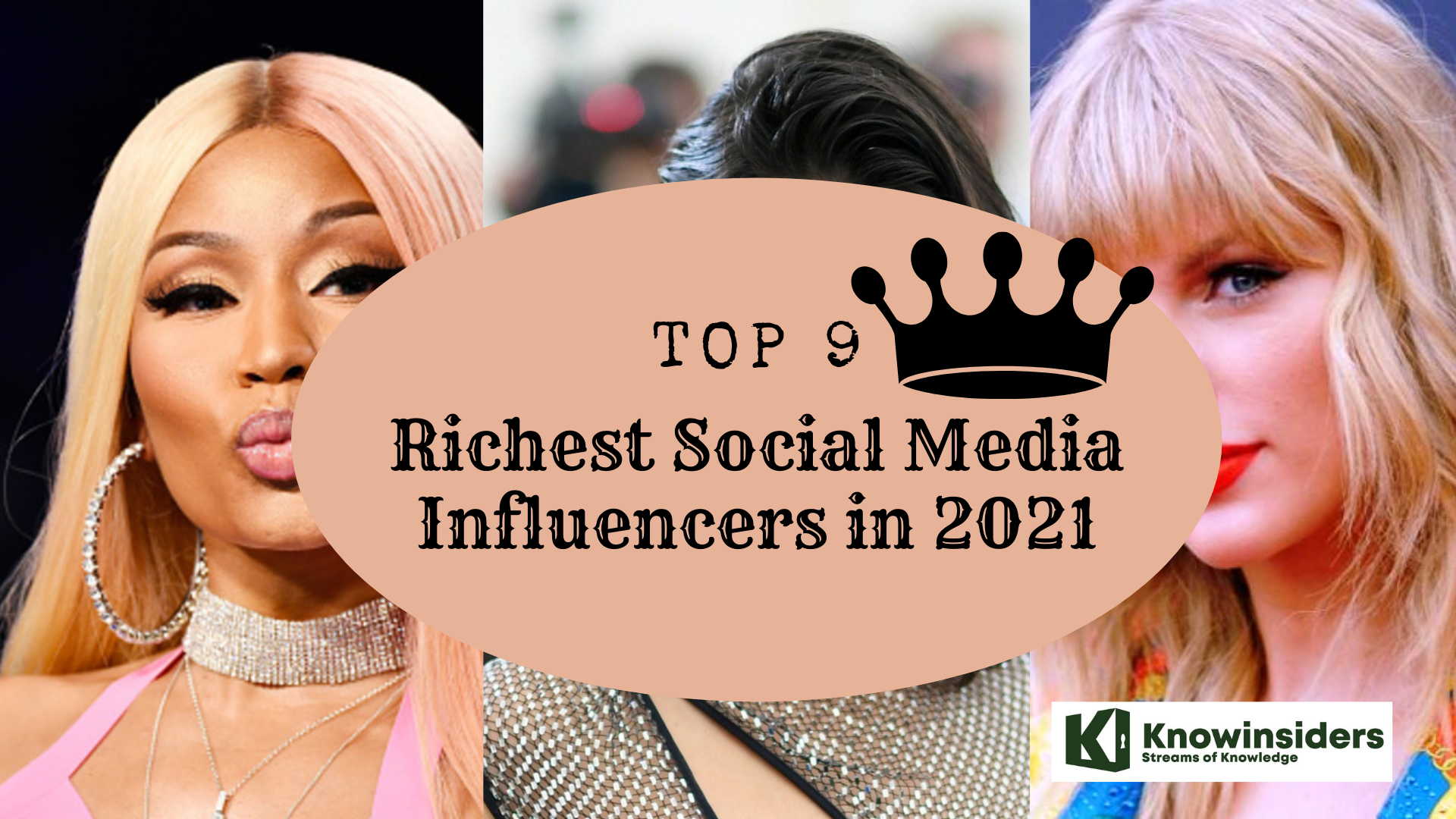 Top 9 Richest Social Media Influencers In America Top 9 Richest Social Media Influencers In America Social media is where people express themselves, and follow their favourite topics, people, places etc. Here is our list of top 9 richest social media ... |
 Who is Natalia Fadeevy on 'Thirst Trap' TikTok Posted by Israeli Soldiers Who is Natalia Fadeevy on 'Thirst Trap' TikTok Posted by Israeli Soldiers TikTok is, in no doubt, popular right now. Israeli Defense Forces soldiers have taken advantage of TikTok to post thirst traps. Israeli soldiers are trying ... |

